
Perry's Saints
or
The Fighting Parson's Regiment
• Title
• Author
• Preface
• Chapter I
• Chapter II
• Chapter III
• Chapter IV
• Chapter V
• Chapter VI
• Chapter VII
• Chapter VIII
• Chapter IX
• Chapter X
• Chapter XI
• Chapter XII
• Chapter XIII
• Chapter XIV
• Chapter XV
• Chapter XVI
• Chapter XVII
• Chapter XVIII
• Chapter XIX
• Chapter XX
PERRY'S SAINTS.
CHAPTER XI.
Good-by to Fort Pulaski. At St. Helena Island, under General Strong. Billinghurst and Regua battery. Folly Island. Masked batteries. Attack on Morris Island. Killed and wounded of the regiment. Captain Lent. Capture of Confederate batteries. Building batteries. Hot work and little rest. Completion of batteries. Assault on Wagner. Badly managed. Terrible losses. General Strong. Negro soldiers. Their effect upon the Confederates. After the assault. The shelling by the Confederates. Incident.
[June, 1863]
JUNE 18, General Gilmore arrived at the fort, and in the evening a telegraphic despatch was received, --for, some time before this, a telegraphic cable had been successfully laid between Braddock's Point and the fort, -- ordering us to have eight companies ready to start in the morning, with cooked rations. Although we were ready at the time appointed, it was decided to be better to defer embarkation until evening, that it might not become known to the Confederates that the garrison was so weakened. Accordingly, when the darkness of night had settled down on the fort, the eight companies marched to the dock and embarked in the Ben De Ford, which steamed away from the fort, but anchored off Tybee Island for the night. Companies G and I were left behind; but before we started, the officers all gathered together, and joined in "Auld Lang Syne." Seldom has such a solemn feeling rested upon us, and the cheers and good-wishes of those who parted there were to many the last words of fellowship together upon earth.The following morning, we passed the Atlanta, on our way to St. Helena Island. It was a formidable-looking craft, being supplied with a heavy armament, and all the appliances for offence and defence, including an immense ram and an ingenious contrivance for exploding torpedoes. Arrived at St. Helena Island, our destination, we found ourselves in the brigade of General Strong.
June 27, the writer was placed in command of the Billinghurst and Regua battery, and separated from the regiment. As soon as detailed, reported to General Strong, and had twenty-five men detailed from the several regiments of the brigade to handle the pieces.
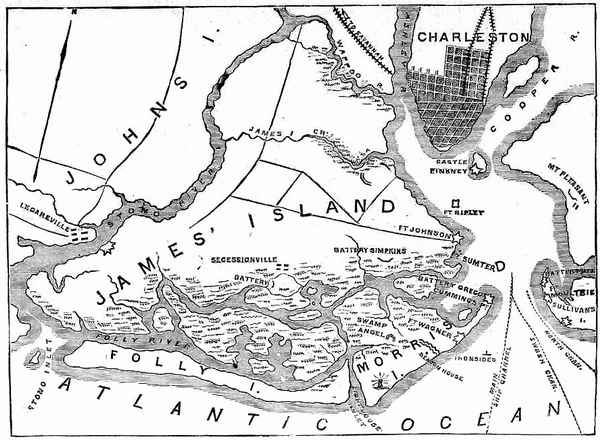
SIEGE OF CHARLESTON.
Each of these consisted of twenty-five riflebarrels on a carriage, so arranged that the fire from a single cap, opposite the centre barrel, was through a tube communicated to all, so that they could be discharged simultaneously. The barrels were heavy, with long range, and, as..a defence against attack of infantry, might be very effective. The idea was similar to the French mitrailleuse; but whether borrowed from it, we cannot tell. This was the only battery of the kind ever used in the department, and, being entirely new, every moment was occupied in practice, in getting the range, and in securing the necessary equipinents. Worse than all, it was necessary to improvise a drill while the practice was going on, but General Strong, who was one of the noblest, kindest, and most considerate of men, assisted in every way, and by all the means at his command. It was not long before we were as much captivated by his military bearing and his gentle urbanity of manner as the other officers and men. of his brigade. . It is given to but few men to attach others to them as he did.
July 4, we were ordered on board the Har-
[July, 1863]
riet M. Weed, and proceeded to Folly Island, on the northerly portion of which we encamped until the 10th, when we moved up to the other end of the island, in rear of our batteries.These contained about fifty guns, and had been masked by a grove of trees until this morning, when a clearing had been made, and the guns opened fire. Only the day previous, a number of Confederate officers had been out on the sandbar which at low tide almost connected Folly with Morris Island, and made a careful inspection of the vicinity, with their field-glasses, all the time in plain sight of our men behind the batteries, but without discovering anything. The bombardment was a disagreeable surprise to them. Arrived behind the batterj ies, we were compelled to go their whole length and return, on account of confusion of orders, while the shot and shell from the Confederate batteries opposite played around us in the most reckless manner. .That night we crossed to Morris Island, and encamped on the beach. In the meantime the 48th, with other troops, had been massed near the end of Folly Island, and as soon as the can- nonading from our guns ceased, landed on Morris Island, charged the Confederate works, and, proceeding on, cleared every obstruction, even to the very foot of Wagner. But not without loss. Quite a number were killed and wounded. Among the killed was Captain Lent of Company A, a man of genial, happy disposition, beloved by everyone. Although a brave, earnest, and competent officer, he was so quiet and retiring in his habits that he seemed almost out of place in such scenes, and it was hard to reconcile so gentle and amiable a life with such a sudden and cruel death. While encamped on Folly Island, he called at the battery on his way to the front, and I well remember his expression as we parted: "How I wish I had your place I I would rather have it than the command of the regiment." It was not of danger that he thought, but of the independence of the command. Before the attack, our regiment was divided for convenience of landing, and while our guns were thundering against the batteries opposite, the men were waiting in anxious expectancy; and when the word was given they shot across the little strip of water, and, in the face of a murderous fire, rushed up the beach, and with fixed bayonets carried all before them. There was no faltering, but only an onward movement; and, although many fell, others supplied their places, and with cheer upon cheer they cleared the Confederate works, capturing men, guns, camp-equipage, and everything, until the recall was sounded, and they, came slowly back to count their dead and wounded. It was a gallant charge, and in it General Strong set the example, when, leaving shoes in the clinging sand, he rushed forward, the first to land, and the last to realize the necessity for a recall. It was a glorious charge and a glorious success, which gave a vailtageground for our troops on which to plant their batteries, and a place for successful operations against the strong defences of Charleston. Had the proper use been made of this early success, Wagner would have been ours; but, unfortunately, the attack on this fort was delayed until the following morning, when, with a garrison re-enforced, our attacking column was easily repulsed. The days that followed were full of labor and exposure. The guns of Wagner and
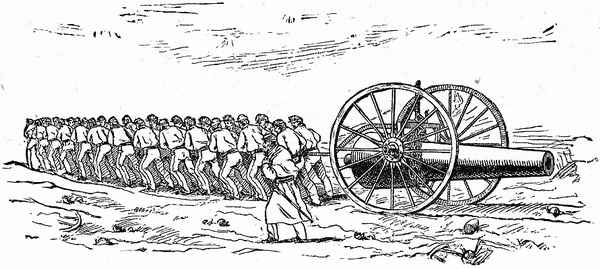
NOISELESS HAULING OF THE GUNS.
Sumter searched every nook and cranny of the island, and many men lay down at night to sleep, to waken in the Eternal City. As fast as possible, guns were hurried up into position to bear upon Wagner, and the heavy armaments of the ironclads kept up a constant clamor, but with little effect; shot and shell came flying
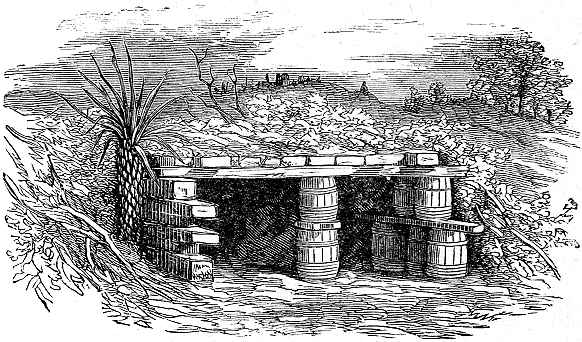
BOMB AND SPLINTER PROOF.
into camp in all directions. General Strong's headquarters were fairly uprooted by a bursting shell, and when solicited to move to a less exposed position he laughed, as if it were only play. Hour by hour he grew into the affections of his command, and it is certain that no officer was ever more beloved. After a time, earthworks were thrown up across the island, near Wagner; and the men, from habit, learned - to protect themselves in some measure from the enemy's fire. July 13, the 48th were at the front for twenty-four hours, during which time the Confederates made a sortie, but were repulsed with considerable loss. A sergeant endeavored to capture Lieutenant Tantum, but made a bad mistake. The powerful grasp of
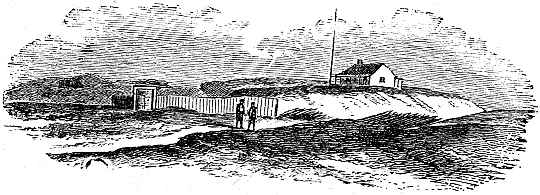
FORT WAGNER AT POINT OF ASSAULT.
| the lieutenant was not to be resisted, and the sergeant went to the rear, an humble prisoner. Attached to our battery, and under my command, was a small company of sharpshooters, with telescopic rifles, who buried themselves ip the sand close to the walls of Wagner in the hour before light in the morning, and proved most effective in controlling the fire of the fort. Not a head or hand could appear without being reminded of their presence. July 18, the attack on Fort Wagner commenced at about 10 A. M., and a steady fire from our batteries and the ironclads was kept up until evening. The following is the account of the assault, written by J. A. Barrett, who was second lieutenant of Company H: - |
"We lay on our arms all day, and just before dark were formed in column by companies, and advanced under a galling fire up the beach. It was a trying hour, our ranks thinning at every stcp. For much of the way the right of our column was obliged to wade in the water. On our left another column composed of the 54th Massachusetts colored regiment, under Colonel Shaw, also advanced on the fort. Wc waded the moat and scaled the parapet. Our loss was terrible, sometimes whole companies being mowed down at once. We jumped over the parapet into one bastion where there were two guns, but the firing was so hot that we were unable to turn them to any use. Darkness was upon us, aud we could see nothing. The supporting columns coming up in our rear, poured in a heavy fire, mistaking us for the rebels. Our killed and wounded kept piling up. A rebel officer for some purpose came among our men, and was seized by a private of the 48th, who called to Colonel Barton that he had a prisoner. To which the colonel replied: 'Take him to the rear.' 'But he won't come,' said the private, who was nicknamed' Plucky.' 'If he wont yield, then bayonet him,' was the order; when a wounded man dragged himself up, and, with all his remaining strength, plunged his bayonet into the side of the rebel officer, and, falling back, expired. A retreat was ordered, but was not altogether understood, and some fifty of our men remained and continued firing. I was severely wounded in the thigh, but roused myself, and directed the fire of these few men as best I could, collecting ammunition from the dead and wounded. When this gave out, I ordered all who could to go to the rear. This section of the fort was literally full of dead and wounded, piled up even with the parapet. I crossed over their bodies, slid down the slope and crossed the moat, which was full of our dead. A rebel sentry was pacing up and down the beach, but by keeping near the bank I was able to pass him. My scabbard was shot away, my pistol bent and useless, and, leaning on my sword, I hobbled down the beach to camp. The 48th went into this assault with five hund!ed men and sixteen officers, and three hundred men and fourteen officers were killed, wounded, or prisoners."While this brief account is valuable, as the statement of a cool, self-possessed, and brave officer, who participated in the assault, and was an eye-witness to what he states, no words can adequately describe the horrors of that night. Sufficient time had elapsed, since the occupation of the island by our troops, to allow of a complete and careful preparation for the assault, which the enemy had reason to expect. A large re-enforcement was added to the garrison, and the men were most carefully drilled in the minutest details, to provide against every possible emergency. The heavy bombardment which preceded the assault, while it seemed as if it would tear the fort. from its foundation, had really no serious effect in weakening it; and as soon as it ceased, the men were withdrawn from the bombproofs, where they had been completely protected, and assigned to their positions, and, when our troops made the assault, were as ready to receive them as if not
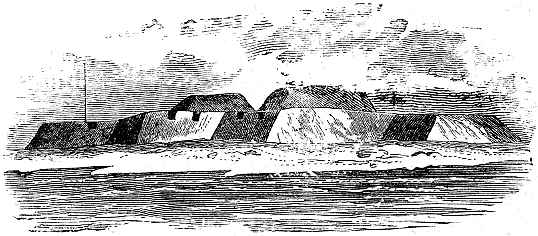
FORT WAGNER, SEA FRONT.
a cannon had been fired. On our part, there seemed to be a want of accurate information, and of carefully matured plan, which resulted in confusion of action; while on their part, there was the most intelligent and thorough preparation possible, and most perfect concert of action between all those assigned to special duties in the defence. The result was inevitable, and the carnage terrible. The responsibility of the assault was generally ascribed to General Seymour, and, as subsequent events clearly proved, it was a useless sacrifice of life. General Gilmore continued to plant batteries, by which we not only reached the forts in the vicinity, but, with the famous Swamp Angel guns, threw shot and shell a distance of five miles into the city of Charleston. These batteries, and the mine which he constructed, which destroyed one whole force of Wagner, compelled its evacuation on the night of September 6.
On the night of the assault, July 18, there was no sleep in the 48th. It was past midnight when the last of the men came in from the fort, and the horrible scenes through which they had passed, and the anguish of grief over friends and comrades, maimed and wounded, or lying silent in that pit of darkness and blood, forbade all thought of rest. Colonel Barton was wounded through the thigh, LieutenantColonel Green, Captains Farrell and Hurst, and Lieutenant Edwards were dead, and Captain Paxson was mortally wounded. Captains Lockwood, Elfwing, and Swartwout, and Lieu- tenants Miller, Barrett, and Acker, were also severely wounded. It was a heart-rending sight when, on the following morning, I visited them in the steamer which was to convey them to Hilton Head. No one could doubt the quality of the 48th now. The heroism of the men was only equalled by that of their officers. None
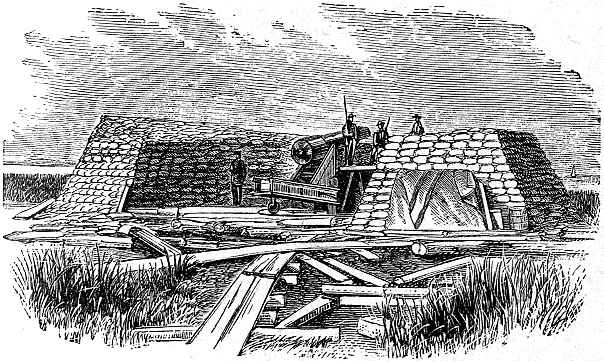
THE SWAMP ANGEL BATTERY.
could have been braver. All the wounded officers had made their escape with the exception of Lieutenants Taylor and Fox, who were left in the hands of the Confederates. While We mourned for our immediate friends and associates, we did not forget that our brigade Commander, General Strong, was among the fatally wounded. I had been accustomed to report to him in person for commands for the battery; and, of all the men I have ever known, few have left such deep and such pleasant impressions on my memory as he - of the gentlest and most winning manners, yet always the thorough soldier, brave even to rashness, kind, courteous, and considerate, he grew mor.e and more beloved as he became better known. He never asked men to go where he would not lead the way.
On the night of the assault, my battery was stationed at the outer lines of our defences, on the shore, to resist any counter attack which the Confederates might make, and I witnessed much of its horrors. As one after another of the wounded came in, eager and anxious were the questions asked, until the return of the torn and broken remnants of the proud columns which a few moments before had rushed to victory told too plainly the story of savage butchery and defeat. Well do I remember-the appearance of the negro soldiers as they came straggling back from the front that night, for I was not favorably impressed by their conduct. I have often thought that their presence in the attacking column was a mistake, and that the hatred and disgust which they caused in the minds of the Confederates overcame every other feeling, to such an extent that the instinct of self-defence was converted into brutal ferocity, as was manifest in their treatment not only of the colored soldiers themselves, but the gallant officers who led them. With the highest respect for the opinions of those who have testified to the discipline and valor of the negro troops, I am impelled to say, in spite of the criticisms that my statement may provoke, that my own observation and experience, as well as the experience of others, have convinced me that the prevailing opinion, especially in New England, of the valuable services rendered by colored troops in actual conflict, is erroneous, and that their most effective work during the war was done with the pick and spade. A quickness of perception and independence of thought and action are desirable qualities in a soldier, this conclusion seems both obvious and necessary. After the repulse of the 18th, the Billinghurst and Regua battery was kept at the front all the time, and, although protected somewhat by earthworks, there was no complete guard against the shells which night and day exploded all about us. One of my men was sitting in the sand just outside the battery, when a shell from Wagner literally ploughed him out of his seat. Fortunately, it did not explode, and he only experienced a good shaking-up. Night after night we were obliged to keep watch of those magnificent streams of light which, proceeding from the mortars at Castle Pinkney, seemed charged with intelligence as well as powder, for as they moved through the air and reached the point over our batteries, they ap. peared to poise themselves as if to select the most vulnerable point, when they descended with a peculiar whizzing sound into our very midst. Our only recourse was, by determining on which side the earthworks they would fall, to make the most expeditious movement to the other side, to await the explosion.
I remember one night when it was determined to plant a chevaux-defrise
from our
battery to low-water mark. A night was chosen when it was thought that the heavy
clouds would ob-
scure the moon and conceal our operations. The wagons proceeded up the beach
with the materials, until they had nearly reached the point selected, when the
opening clouds disclosed them to the garrison of Wagner. No time was lost in
opening upon them with their Armstrong guns, from the parapet. The first shot
produced a stampede, and in an instant the teams had turned about, and the
horses were scampering back, with the shot a,nd shell skipping about them in
the most unceremonious fashion. The sight was so ludicrous that I was thrown off
my guard, and exploding with laughter, until the danger of my own position was
recalled by the bursting of shells about my head.